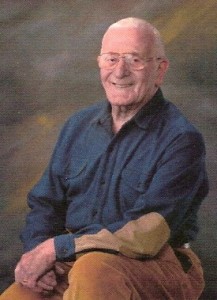
“My Connection to Monroe County History” by James Banks
I was born and raised in Raleigh County in the mining town of Raleigh within walking distance of Beckley. I graduated from Woodrow Wilson High School, and from West Virginia University in 1943.
After service in the Navy as a Hospital Corpsman, I graduated from the University of Arkansas Medical School in 1949 and went back to duty in the Navy as a Medical officer. I returned to Raleigh County in 1952, to the village of Beaver where I practiced as a family physician until 1958 before going to Richmond, Virginia, to take a residency in Orthopedic Surgery. In 1961, I joined an Orthopedic practice in Hagerstown, Maryland, until 1977. Then I moved to my farm in Monroe County about six miles southeast of Union. It took me less then a year to realize that I was not a farmer and I joined Greenbrier Physicians Clinic in Ronceverte, where I practiced until 2002.
I began writing Outdoor articles for the Baltimore Sunday Sun while in Hagerstown and continued writing articles for the West Virginia Hillbilly, Charleston Gazette, and Outdoors Today, a weekly paper in St. Louis, Missouri, while trying to be a farmer in Monroe County.
As an Elder in the Union Presbyterian Church, I volunteered to write a piece about the formation of that Church for its Bicentennial to take place in 1982. It turned into a book titled “200 Years from Good Hope”. A history of the Presbyterian Churches in Monroe County.
In 1996, I wrote “House Calls in the Hills: Memoirs of a Country Doctor”, which is about my days in practice in Beaver, West Virginia. It is still in print by Mountain State Press in Charleston.
When I closed my practice of Orthopedic Surgery in 2002, I began my lifetime dream of writing a historical novel about my g-g-g-grandmother Margaret Erskine and her captivity by the Shawnee as she and her first husband, John Paulee, along with several others were traveling to Kentucky. This book became “The Call of the Hawk”.
The story as I have written it concerns her journey back to the white world after six years of captivity, along with her son, John Paulee, Jr. who was born a few months after her captivity, and then jumps forward twenty years when John goes back west to see his Indian friends, especially Chief Blue Jacket and his French-Indian wife Monet, and his close friend Tekamtha, or as the “white faces” call him, Tecumseh.
John had never really adapted to the white world having known only the life of an Indian for his first six years. Additionally, he and his mother lived with his Uncle John Handley and his family at Handley’s Fort. John Handley had been a major in the militia under General George Rogers Clark and had actually participated in two raids against the village where his sister had been living. Handley’s feelings toward Indians, the Shawnee especially, was unbounded, leading a lot of disputes between young John Paulee and Handley. Margaret Paulee then married Michael Erskine and had several children at their home, at Walnut Grove.
The return of Hugh Caperton to Monroe County after the death of his father Adam in Kentucky, at the battle with Indians near Mt. Sterling, Kentucky, presented problems with John Paulee, and it became worse when Hugh Caperton became engaged to Jane Erskine, Margaret’s daughter, and that is what pushed John into going west.
Nothing more is known of John except what Margaret, in her narrative, dictated when she was in her eighties to her grandson Allen Taylor Caperton. Allen Caperton said “John was killed by a savage band of Indians while bringing a load of furs down the Yellowstone.” It is not revealed how or when she received such information and I have not been able to find any record of John Paulee in records of fur trading companies. Michael Erskine died in 1812 and his will does not include John Paulee. I suspect that it was about 1809 when numerous expeditions went up the Missouri and all of them experienced problems with the Blackfeet tribes.
Letters in my family always referred to “…..poor Margaret’s ordeal”. Several different versions of her story, based on her dictated narrative, are sound. The original handwritten account is at The Library of Virginia, but I do have a photocopy of the original, and I have based my novel upon that account. It is the Epilogue that reveals the connection with the title. “The Call of the Hawk”.
As a final note, unknown to me at the time, the farm which I purchased in 1975 was the site of Handley’s Fort. Handley’s Fort was actually a fortified house and used primary to store powder and lead, and a gathering place if the Indians were in the area. People of our era spoke of it as “the poor farm”, which it became when the Handley heirs sold it to the county in about the year 1880.
The book is available at the Open Book in Lewisburg, West Virginia and The Silver Birch in Union (it is new and a delightful antique store and gallery in the old theater building on Main Street). It can also be ordered from Amazon, Barnes and Noble, or from the publisher, PublishAmerica in Frederick, Maryland, where it is also available in paperback. I usually keep a few on hand.
Other books that I have written are “Trophies I Can’t Hang on the Wall”, stories about experiences in fishing and hunting and my latest historical novel, “Frontier Surgeon”, based loosely on my ancestor, a physician, who came to this country just in time to get caught up in the French and Indian War. It is currently being considered by a publisher.
James “Jay” Banks
Friend of Union High School

